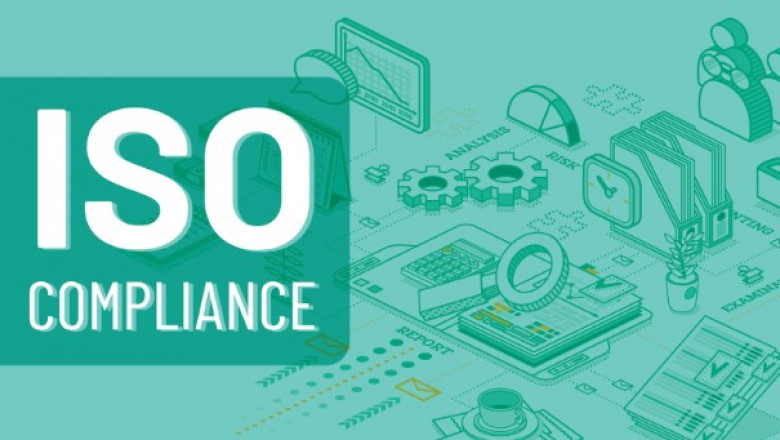views
ISO Compliance as a Catalyst for Enhanced ESG Transparency and Accountability
One of the most effective ways to integrate sustainability into a company’s operations is through adherence to ISO (International Organization for Standardization) compliance. ISO standards, recognised globally, provide a structured framework for ensuring quality, safety, and efficiency. When paired with Environmental, Social, and Governance (ESG) goals, ISO compliance becomes a powerful catalyst for enhancing transparency and accountability in businesses, helping them meet both internal and external expectations.
The Growing Importance of ESG
Investors, customers, and regulators now demand that companies focus on profitability and demonstrate a commitment to responsible environmental practices, social equity, and strong governance. Integrating ESG criteria into corporate decision-making helps businesses improve their sustainability, mitigate risks, and create value for all stakeholders.
Transparency and accountability are two critical aspects of a strong ESG strategy. Without clear and accurate reporting, it becomes difficult for stakeholders to assess whether a company is truly committed to ESG goals or simply paying lip service. This is where ISO compliance can play a vital role.
How ISO Compliance Drives ESG Transparency
ISO standards ensure that organisations meet globally recognised criteria for various aspects of their operations. For example, ISO 14001, the environmental management standard, helps companies identify, manage, and reduce their environmental impact. ISO 26000, which guides social responsibility, assists companies in aligning their social and ethical practices with international expectations.
By adopting these and other relevant ISO standards, businesses can create a transparent framework for their ESG initiatives. ISO compliance offers a structured approach to documenting, measuring, and reporting on a company’s ESG performance, ensuring that the company’s environmental and social impacts are consistently monitored and accurately reported. This transparency allows stakeholders—including investors, customers, and regulators—better to understand a company’s commitment to sustainable practices.
ISO-certified companies often undergo regular audits and evaluations to maintain compliance. These audits provide an independent, third-party review of a company’s operations, verifying that it meets the standards required for ISO certification. This audit process ensures transparency and promotes continual improvement by highlighting areas where a company’s ESG efforts can be enhanced.
Enhancing Accountability Through ISO Compliance
Accountability is a core principle of both ISO compliance and ESG reporting. ISO standards require companies to establish clear policies and procedures, monitor their progress, and take corrective actions when necessary. This approach fosters a culture of accountability within the organisation.
For example, ISO 9001, the quality management standard, encourages businesses to identify risks and opportunities and implement solutions to address them. This can be particularly useful for ESG strategies, where identifying and mitigating risks related to environmental sustainability, human rights, or governance issues is crucial. By adopting ISO frameworks, companies can ensure that their ESG practices are effective and aligned with global best practices.
ISO certification also provides a basis for external accountability. Many ISO-certified companies choose to disclose their ESG data and performance metrics publicly. This openness reinforces their commitment to transparency and allows stakeholders to assess whether the company meets its ESG goals. Furthermore, ISO compliance can help companies demonstrate their ESG commitment to investors, which may be particularly important as more and more investors prioritise companies with strong ESG profiles.
The Synergy Between ISO and ESG
The intersection of ISO compliance and ESG offers companies several benefits. First and foremost, it helps organisations identify risks, enhance operational efficiency, and improve stakeholder trust. ISO standards provide a clear and systematic approach to managing key aspects of ESG—reducing carbon emissions, ensuring fair labour practices, or improving corporate governance.
For instance, by integrating ISO 14001 (environmental management) with ESG objectives, companies can reduce their environmental footprint while ensuring they meet stringent regulatory requirements. ISO 45001, focused on occupational health and safety, complements the social aspect of ESG by helping businesses protect their workers and create safe and fair working conditions. Moreover, ISO 37001, an anti-bribery management standard, strengthens governance, promoting ethical business practices and reducing the risk of corruption.
Conclusion
ISO compliance plays a crucial role in enhancing ESG transparency and accountability. Companies can build a robust, reliable system for managing their environmental, social, and governance efforts by adopting ISO standards. These standards not only provide a framework for continuous improvement but also ensure that companies are held accountable for their ESG commitments.






















Comments
0 comment